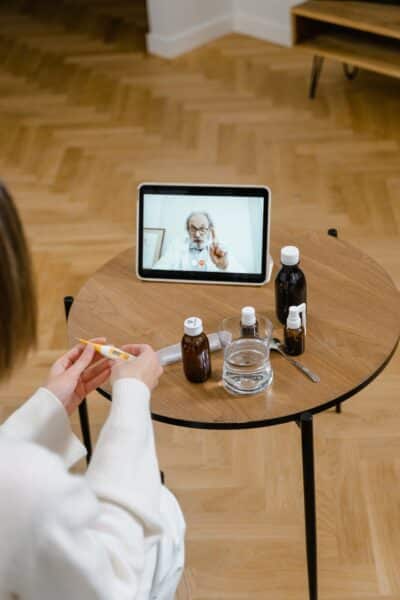The future of acute care is taking shape with groundbreaking transformations to enhance patient outcomes. Anthony Misitano of PAM Health points out that as technology advances and our understanding of medical science deepens, a paradigm shift occurs in delivering acute care.
This article explores the exciting developments shaping the future of acute care, from innovative technologies to patient-centered approaches. This means delivering transformative medical services that can potentially provide better quality of care for patients.
IMAGE: PEXELS
The Rise Of Telemedicine
One of the most significant changes in acute care is the growing prominence of telemedicine. Connecting with healthcare professionals remotely has proven invaluable, especially during times of crisis, such as the recent global pandemic.
Telemedicine increases access to medical services and provides more efficient and timely interventions. Patients can now consult with healthcare providers through video calls, receive real-time medical advice, and even undergo virtual examinations.
This minimizes the need for physical visits and enhances the overall patient experience. The convenience of telemedicine is reshaping the traditional doctor-patient relationship, making healthcare more accessible and patient-centric.
Artificial Intelligence In Diagnostics And Treatment
Artificial intelligence (AI) revolutionizes acute care by accelerating diagnostics and improving treatment plans. AI algorithms can analyze vast amounts of medical data with unparalleled speed and accuracy, aiding healthcare professionals in making more informed decisions.
This reduces the time taken to reach a diagnosis and ensures a more personalized approach to treatment. Machine learning algorithms are being employed to predict patient outcomes, allowing for early intervention and preventive measures.
This proactive approach enhances the efficacy of acute care, leading to better patient outcomes and a more efficient healthcare system. Imagine being guided by AI to deliver accurate interventions that make a patient’s journey to healing more comfortable.
Personalized Medicine And Genomics
The future of acute care is moving towards a more personalized approach, thanks to genomics and personalized medicine advancements. Understanding an individual’s genetic makeup allows healthcare providers to tailor treatment plans based on the patient’s unique characteristics.
This targeted approach minimizes adverse effects and increases the effectiveness of medical interventions. Genomic research unlocks the secrets of various diseases, enabling the development of personalized therapies.
This improves treatment outcomes and paves the way for more effective preventive strategies. Integrating genomics into acute care represents a shift from a one-size-fits-all approach to a more precise and individualized model.
Robotics In Surgical Interventions
The integration of robotics into acute care is transforming the field of surgery. Robotic-assisted surgeries provide surgeons with enhanced precision and control, improving surgical outcomes. Using robotic systems in minimally invasive procedures reduces recovery times and minimizes postoperative complications.
These robotic systems are not meant to replace human surgeons but to augment their capabilities. The synergy between human expertise and robotic precision is ushering in a new era of surgical interventions, offering patients safer and more efficient treatment options.
Patient-Centered Care Models
The future of acute care is increasingly focused on patient-centered care models prioritizing patients’ needs and preferences. Healthcare providers recognize the importance of involving patients in decision-making, fostering a collaborative approach to care.
Patient-centered care goes beyond treating the symptoms and addresses the holistic well-being of individuals. This approach considers the patient’s values, preferences, and lifestyle, leading to more personalized and effective treatment plans.
As acute care evolves, PAM Health founder Anthony Misitano explains that emphasizing patient empowerment and engagement is becoming a cornerstone of medical services.
Remote Patient Monitoring
Advancements in wearable technology and remote monitoring devices are changing how healthcare professionals track and manage patients’ health. Remote patient monitoring allows for continuous tracking of vital signs, medication adherence, and other relevant health metrics outside traditional healthcare settings. This real-time data enables healthcare providers to intervene promptly if any concerning trends are identified, preventing complications and hospital readmissions.
Remote patient monitoring is particularly beneficial for individuals with chronic conditions because it offers a proactive approach to managing their health and reducing the burden on acute care facilities.
Ethical Considerations In The Age Of Technology
While embracing the advancements in acute care, addressing the ethical considerations of integrating technology is crucial. Issues such as patient privacy, data security, and equitable access to healthcare must be carefully navigated to ensure that all share the benefits of technological progress.
As we move towards a future where data-driven decisions and artificial intelligence play a pivotal role in healthcare, striking the right balance between innovation and ethical principles becomes paramount.
The ongoing dialogue about these ethical considerations is essential to building a healthcare system that excels in technological prowess and upholds the values of compassion, equity, and integrity.
PAM Health – Conclusion
The future of acute care is a dynamic landscape shaped by technological innovations, personalized medicine, patient-centered care models, and ongoing ethical considerations.
Telemedicine, artificial intelligence, genomics, robotics, remote patient monitoring, and the mindful navigation of ethical challenges collectively steer the course toward better patient outcomes and a more responsive healthcare system.
Embracing these transformative changes ensures that the future of acute care is not just about treating illnesses but also about empowering individuals to lead healthier lives grounded in a commitment to technological progress and ethical integrity.
IMAGE: PEXELS
If you are interested in even more technology-related articles and information from us here at Bit Rebels, then we have a lot to choose from.


COMMENTS